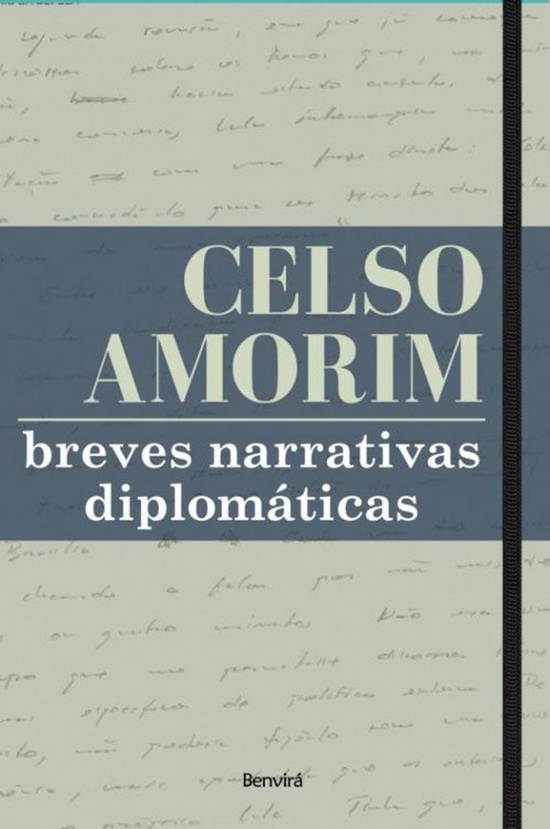“Breves narrativas diplomáticas” (“Short diplomatic stories”, my translation) by Celso Amorim. Benvirá, 168 páginas, R$ 27
Few diplomats have influenced Brazil’s foreign policy more over the past two decades than Celso Amorim. After having served as Foreign Minister under President Itamar Franco from 1993 to 1995, Amorim once again headed Itamaraty between 2003 and 2010, became one of Lula’s most trusted advisers and, together with the President, turned into the symbol of Brazil’s rapprochement with the Global South.
This strategy, which helped spawn outfits such as IBSA and BRICS, and turned Brazil into a key player in Africa, was long seen as an ideology-driven, ill-conceived attempt to distance Brazil from the United States. Ironically, at the time, Brazil would have pursued it with or without Lula: José Serra, who lost the presidential election to Lula in 2002, had also been thinking about choosing Amorim as Foreign Minister. In fact, as this book makes clear, Amorim had never had any close contact to Lula and the two only began to engage after Lula’s election victory.
After Conversas com jovens diplomatas (“Conversations with young diplomats”, my translation), published in 2011, Breves narrativas diplomáticas is Amorim’s second book after leaving the foreign ministry, in an attempt to make sense of the momentous times Brazil went through during the first years of the Lula presidency, particularly the years 2002-2004.
In retrospect, Amorim may be seen by historians as one of the finest diplomats of his time. He was Foreign Minister during a decade that seemed to be tailor-made for Brazil: high economic growth figures at home, even when Europe and the United States were in recession, allowed the Brazil to gain unprecedented visibility. The ill-conceived and costly military intervention in Iraq severely affected US legitimacy and Jim O’Neill’s invention of the BRIC label added to a sense that the world was quickly moving towards a post-Western multipolar system. Brazil masterfully recognized and took advantage of this historic window of opportunity. As a consequence, Latin America’s largest country today is widely accepted as an emerging power that is set to shape the global conversation in the 21st century.
The response was not always positive, both at home and abroad. Foreign Affairs, one of the most important international relations magazines in the world, wrote that Brazil was an “irresponsible stakeholder”, and Foreign Policy, another magazine, argued that Brazil’s policies would make the world more “corrupt, chaotic, and authoritarian”. Global Governance, a leading academic journal, portrayed Brazil as “the most revisionist of all emerging powers … a rising spoiler”.
And yet, despite all the criticism, Amorim’s activism under Lula left a powerful legacy. Despite Rousseff’s more timid international strategy, Brazil is highly unlikely to return to the margins of the international stage, where it was firmly located at the end of the 1990s.
A more recent example makes this clear: A year after Amorim’s departure from Itamaraty, Brazil launched a concept note on the ‘Responsibility while Protecting’. RwP symbolized the very strategy Brazil aspired to pursue: turn into a bridge builder, mediator and consensus seeker through thought leadership. RwP, despite its flaws, was an innovative and constructive proposal to bridge the gap between an overly trigger-happy NATO and excessively resistant China and Russia. Academics in Brazil and abroad lauded Brazil’s initiative. Above all, the initiative provided a glimpse of what Brazil is capable of on a global scale. Despite Brazil’s limited hard power, it temporarily exercised international leadership in a debate that is likely to shape international affairs for decades to come. Ironically, Amorim’s stance regarding the Responsibility to Protect (R2P) was marked by profound scepticism towards what he initially saw as a newly packaged version of the polemic ‘droit d’ingérence.’ And yet, Brazil’s international leadership in the debate about humanitarian intervention was, to no small degree, possible because of Amorim’s tireless promotion of Brazil as an international actor during the century’s first decade.
The book would be highly useful to readers outside of Brazil because it provides a vivid impression of how Brazil, a country which often criticizes today’s global order, perceived and engaged in the major debates of the time – the Iraq War in 2003, the negotiations around the FTAA, the WTO and the 2002 crisis in Venezuela. The description of the latter provides fascinating insights into Brazil’s emerging role as a regional mediator, which it has been able to consolidate since then.
As one would expect, the book is full of (at times comical) details about Brazilian diplomacy. For example, Amorim profoundly disliked meetings at U.S. embassies because they brewed terrible coffee, which led the U.S. mission in Geneva to buy an espresso machine. Amorim’s description of the creation of IBSA, a trilateral outfit made up of India, Brazil and South Africa includes a series of thoughtful reflections on the special relationship between democracies, which sets IBSA apart from BRICS. The author’s views about Indian policy makers and their negotiation style is noteworthy and unusually frank. For example, Amorim describes the “devilish intelligence” of Kamal Nath, currently India’s Minister of Urban Development, which the latter mostly used to “create confusion even about rather simple matters.” This does not change his overall assessment that India could become an important partner to Brazil in the future. It is particularly when writing about the creation of IBSA and BRIC(S) that the author could have provided more details, given that so little has been published on the matter.
Given that author remains active in politics (he is currently Minister of Defense), the book understandably avoids harsh self-criticism. And yet, it makes, just like Amorim’s previous book, a highly interesting read for those seeking to understand Brazil’s foreign policy during the early days of the Lula administration. Publishing it in English would be an important step towards making Brazil’s domestic foreign policy debate more accessible to the rest of the world.
Read also:
Brazil’s enigmatic retreat: The case of the Responsibility while Protecting (RwP)
Book review: “Samudra Mathan: Sino-Indian Rivalry in the Indo-Pacific” by C. Raja Mohan









